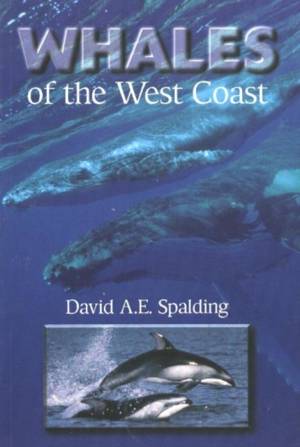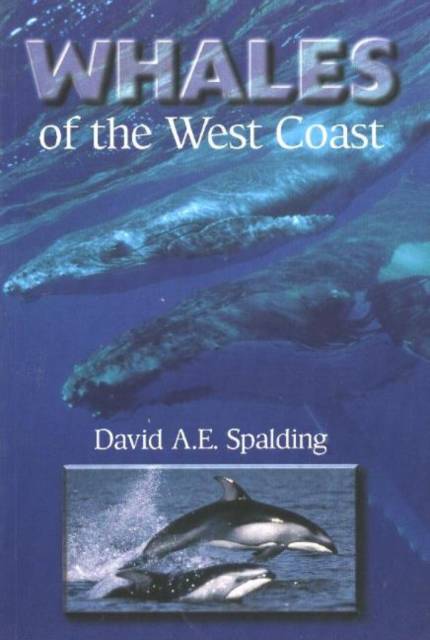
En raison d'une grêve chez bpost, votre commande pourrait être retardée. Vous avez besoin d’un livre rapidement ? Nos magasins vous accueillent à bras ouverts !
- Retrait gratuit dans votre magasin Club
- 7.000.000 titres dans notre catalogue
- Payer en toute sécurité
- Toujours un magasin près de chez vous
En raison de la grêve chez bpost, votre commande pourrait être retardée. Vous avez besoin d’un livre rapidement ? Nos magasins vous accueillent à bras ouverts !
- Retrait gratuit dans votre magasin Club
- 7.000.0000 titres dans notre catalogue
- Payer en toute sécurité
- Toujours un magasin près de chez vous
Description
Whales, although among our most important and interesting animals, have been little studied until recently. Almost a third of about seventy living cetacean species have been recorded in North American Pacific coast waters.
Our word whale describes glimpses of surfacing cetaceans; its Old English root hvael means a wheel. A large whale's rolling back often looks just like the rim of a wheel revolving below the surface. Humans have watched whales with fascination for a long time. There is an emerging whale culture, in which whales have actual - or at least symbolic - importance in our society. Although first substantive human contact with whales most likely began with whaling - archeology suggests an aboriginal whaling tradition dating back 3,000 years on the West Coast - contemporary interest in whales now primarily concerns how to conserve these species for the future.
Whales of the West Coast provides a broad overview of whale natural history, with particular reference to species found in the waters of the Pacific Northwest. The book also examines human interactions with whales, from how First Nations practised whaling on the BC coast and how commercial whaling spread through the Pacific and continued on the Northwest coast until late in this century; to how science has evolved from measurement and anatomy into exciting studies of wild whales. Population decline due to whaling inspired the modern whale conservation movement how to ensure that whales share the seas with future human generations, and first hand experiences through aquaria, land-based watching and whale watching by boat. We also learn how to enjoy whales without direct contact with the living animal. There are also lists with useful information, including Whales Words, addresses of relevant agencies, publications and other media. Whales Through Time provides a chronological framework to the whle story, from the earliest items to the most recent discoveries. Through the seasons in a month-by-month list of when and where whales regularly appear. The book also lists major sites and services which make it possible to see whales in captivity and in the wild.
Huge, powerful, intelligent and beautiful, whales have fascinated human beings for millennia. Here is a book that will answer every question you ever had about whales and dolphins of the west coast.
Our word whale describes glimpses of surfacing cetaceans; its Old English root hvael means a wheel. A large whale's rolling back often looks just like the rim of a wheel revolving below the surface. Humans have watched whales with fascination for a long time. There is an emerging whale culture, in which whales have actual - or at least symbolic - importance in our society. Although first substantive human contact with whales most likely began with whaling - archeology suggests an aboriginal whaling tradition dating back 3,000 years on the West Coast - contemporary interest in whales now primarily concerns how to conserve these species for the future.
Whales of the West Coast provides a broad overview of whale natural history, with particular reference to species found in the waters of the Pacific Northwest. The book also examines human interactions with whales, from how First Nations practised whaling on the BC coast and how commercial whaling spread through the Pacific and continued on the Northwest coast until late in this century; to how science has evolved from measurement and anatomy into exciting studies of wild whales. Population decline due to whaling inspired the modern whale conservation movement how to ensure that whales share the seas with future human generations, and first hand experiences through aquaria, land-based watching and whale watching by boat. We also learn how to enjoy whales without direct contact with the living animal. There are also lists with useful information, including Whales Words, addresses of relevant agencies, publications and other media. Whales Through Time provides a chronological framework to the whle story, from the earliest items to the most recent discoveries. Through the seasons in a month-by-month list of when and where whales regularly appear. The book also lists major sites and services which make it possible to see whales in captivity and in the wild.
Huge, powerful, intelligent and beautiful, whales have fascinated human beings for millennia. Here is a book that will answer every question you ever had about whales and dolphins of the west coast.
Spécifications
Parties prenantes
- Auteur(s) :
- Editeur:
Contenu
- Nombre de pages :
- 216
- Langue:
- Anglais
Caractéristiques
- EAN:
- 9781550171990
- Date de parution :
- 01-01-99
- Format:
- Livre broché
- Format numérique:
- Trade paperback (VS)
- Dimensions :
- 150 mm x 226 mm
- Poids :
- 362 g

Les avis
Nous publions uniquement les avis qui respectent les conditions requises. Consultez nos conditions pour les avis.






